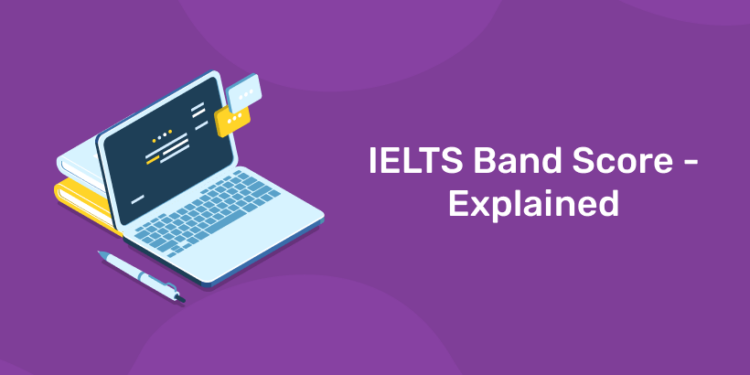Table of Contents
The International English Language Testing System (IELTS) is a globally recognized language proficiency test that opens doors to numerous educational and professional opportunities worldwide. The IELTS Band Score is an essential aspect of this test, as it serves as a standardized measurement of a candidate’s English language skills. In this article, we will delve into the significance of the IELTS Band Score, its components, and how it influences your prospects for international communication and success.
IELTS Band Score:
The IELTS Band Score is a numerical representation of a test taker’s English language proficiency, ranging from 0 to 9. Each Band Score corresponds to a specific level of language ability, assessing the candidate’s skills in four key areas: Listening, Reading, Writing, and Speaking. The Band Score indicates the candidate’s competence in these areas, providing a comprehensive evaluation of their language proficiency.
The IELTS Scale
| 9 | Expert user | The candidate exhibits exceptional mastery of the English language, demonstrating an impeccable command that is both precise and fluent. Their use of English is not only appropriate but also exhibits a deep understanding of the nuances of the language |
| 8 | Very good user | The candidate demonstrates a high level of proficiency in the English language, showcasing an impressive command with only sporadic, minor inaccuracies or instances of inappropriate usage. Notably, the candidate excels in handling intricate and detailed arguments, effectively conveying their thoughts with clarity and precision. |
| 7 | Good user | The test taker has operational command of the language, though with occasional inaccuracies, inappropriate usage and misunderstandings in some situations. They generally handle complex language well and understand detailed reasoning. |
| 6 | Competent user | The test taker has an effective command of the language despite some inaccuracies, inappropriate usage and misunderstandings. They can use and understand fairly complex language, particularly in familiar situations. |
| 5 | Modest user | The test taker has a partial command of the language and copes with overall meaning in most situations, although they are likely to make many mistakes. They should be able to handle basic communication in their own field. |
| 4 | Limited user | The test taker’s basic competence is limited to familiar situations. They frequently show problems in understanding and expression. They are not able to use complex language. |
| 3 | Extremely limited user | The test taker conveys and understands only general meaning in very familiar situations. There are frequent breakdowns in communication. |
| 2 | Intermittent user | The candidate encounters significant challenges in comprehending both spoken and written English. They struggle to understand the language, facing substantial difficulties in grasping the meaning and intent behind oral and written communication. |
| 1 | Non-user | The test taker has no ability to use the language. Their communication skills are severely restricted, with only a few isolated words at their disposal |
| 0 | Did not attempt the test | The test taker did not answer the questions. |
Calculating the overall band score
A score is given for each test – Listening, Reading, Writing and Speaking. These individual scores are then averaged and rounded to the nearest half band, to produce an overall band score.
The Test Report Form provides both your overall band score and individual band scores for the four sections: Listening, Reading, Writing, and Speaking, offering a comprehensive evaluation of your performance.
For Joining the Online IELTS Course, Download the Entri Learning App Now!
Overall Band Score
The overall band score is the average of the four sections scores, rounded to the nearest whole or half band. The sections scores are weighted equally.
Examples:
| Listening | Reading | Writing | Speaking | Average of four components (total of the four individual component scores divided by four) |
Bandscore | |
| Test Taker A | 6.5 | 6.5 | 5.0 | 7.0 | 6.25 | 6.5 |
| Test Taker B | 4.0 | 3.5 | 4.0 | 4.0 | 3.875 | 4.0 |
| Test Taker C | 6.5 | 6.5 | 5.5 | 6.0 | 6.125 | 6.0 |
If the average of the four sections ends in .25, the overall band score is rounded up to the next half band, and if it ends in .75, the overall band score is rounded up to the next whole band.
Section Band Scores
Listening
In the IELTS Listening test, there are a total of 40 questions, and each correct answer is assigned one mark. The scores out of 40, are then converted to the nine-band scale used by IELTS. The final scores are reported in both whole and half bands
Reading
The IELTS Reading test contains 40 questions. Each correct answer is awarded one mark. Scores out of 40 are converted to the IELTS nine-band scale. Scores are reported in whole and half bands.
Check below table to know the average number of marks required to achieve a particular band score in Listening, Academic Reading and General Training Reading. Note that the precise number of marks needed to achieve these band scores will vary slightly from test version to test version.
Listening
| Band score | Raw score out of 40 |
| 5 | 16 |
| 6 | 23 |
| 7 | 30 |
| 8 | 35 |
Academic Reading
| Band score | Raw score out of 40 |
| 5 | 15 |
| 6 | 23 |
| 7 | 30 |
| 8 | 35 |
General Training Reading
| Band score | Raw score out of 40 |
| 4 | 15 |
| 5 | 23 |
| 6 | 30 |
| 7 | 34 |
| 8 | 38 |
Writing
Examiners use assessment criteria to award a band score for each of the four criteria:
- Task Achievement (for Task 1), Task Response (for Task 2)
- Coherence and Cohesion
- Lexical Resource
- Grammatical Range and Accuracy
The criteria are weighted equally and the score on the task is the average.
Speaking
Examiners use assessment criteria to award a band score for each of the four criteria:
- Fluency and Coherence
- Lexical Resource
- Grammatical Range and Accuracy
- Pronunciation
Components of the IELTS Band Score:
- Listening: The Listening component of the IELTS exam assesses a candidate’s ability to comprehend spoken English in various contexts. The Band Score evaluates the accuracy and comprehension of the test taker’s listening skills, including their understanding of conversations, lectures, and audio recordings.
- Reading: The Reading component evaluates a candidate’s ability to comprehend written English texts. It measures their reading speed, vocabulary, and comprehension skills. The Band Score reflects the candidate’s accuracy and efficiency in understanding and analyzing different types of written materials.
- Writing: The Writing component assesses a candidate’s ability to express their thoughts clearly and coherently in written English. The Band Score considers the candidate’s grammatical accuracy, vocabulary usage, organization of ideas, and task response. It evaluates their ability to write essays, reports, and other forms of written communication.
- Speaking: The Speaking component evaluates a candidate’s oral communication skills in English. The Band Score considers the candidate’s fluency, pronunciation, vocabulary, grammar, and coherence in expressing ideas during a face-to-face interview. It assesses their ability to engage in a conversation, provide opinions, and articulate thoughts effectively.
Impact of IELTS Band Score on International Communication and Opportunities:
The IELTS Band Score plays a vital role in international communication and various educational and professional opportunities. A high Band Score is often required by universities, colleges, and educational institutions for admission to undergraduate or postgraduate programs. It is also a prerequisite for immigration processes, work visas, and professional certifications in English-speaking countries.
A higher Band Score demonstrates a candidate’s proficiency in English and enhances their ability to communicate effectively in academic, professional, and social settings. It increases the chances of success in international collaborations, employment opportunities, and academic pursuits abroad.
How to Improve IELTS Band Score?
To improve your IELTS Band Score, it is essential to focus on all four components of the test. Enhancing your language skills through consistent practice, exposure to English language resources, and seeking guidance from reputable IELTS preparation courses can significantly boost your performance. Familiarize yourself with the test format, practice with sample papers, and engage in conversations with native English speakers to enhance your fluency and confidence.
Conclusion:
The IELTS Band Score serves as a benchmark for assessing a candidate’s English language proficiency, influencing their opportunities for international communication, education, and employment. Understanding the components of the IELTS Band Score and preparing strategically can greatly enhance your chances of achieving a desirable Band Score. By investing time and effort into improving your language skills, you can unlock a world of possibilities and broaden your horizons for successful global communication and engagement.
| Related Links | |
| All About IELTS Exam | IELTS Reading Practice Test |
| IELTS Listening Practice Test | IELTS Writing Practice Test |
| IELTS Speaking Practice Test | IELTS Score for UK |
Reference:
IELTS scoring in detail. (n.d.). https://www.ielts.org/for-organisations/ielts-scoring-in-detail










